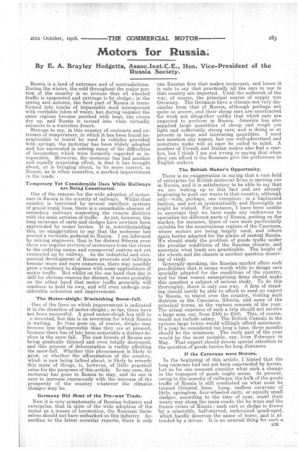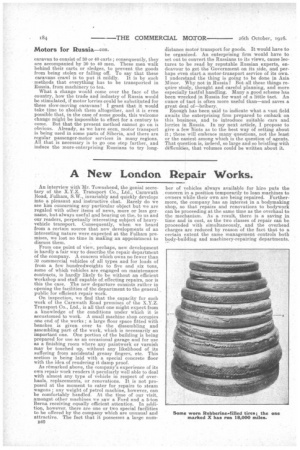Motors for Russia;
Page 11

Page 12

If you've noticed an error in this article please click here to report it so we can fix it.
By E. A. Brayley Hodgetts, Assoc.Inst.C.E., Hon. Vice-President of the
Russia Society.
Russia is a land of extremes and of contradictions. During the winter, the cold throughout the major portion of the country is so intense that all wheeled traffic is suspended and carriage is by sledge ; in the spring and autumn, the best part of Russia is transformed into tracks of impassable mud interspersed with veritable lakes of water, but during summer the same regions become parched with heat, the rivers dry up, and Russia is turned into what, virtually amounts to a waterless desert.
Strange to say, in this country of contrasts and extremes of temperature, in which it has been found impracticable to travel by road in vehicles provided with springs, the motorcar has been widely adopted and has succeeded in solving many of the difficulties of locomotion which were formerly regarded as insuperable. Moreover, the motorcar has had another and equally surprising effect, in that it has brought about, or is bringing about, to be more correct, in Russia, as in other countries, a marked improvement in the roads.
Temporary Yet Considerable Uses While Railways are Being Constructed.
One of the reasons for the wide adoption of motorcars in Russia is the scarcity of railways. Whilst that country is traversed by several excellent systems of grand trunk lines, there is a remarkable absence of secondary railways connecting the remote districts with the main arteries of traffic. As yet, however, the long caravans of carts and sledges have nowhere been superseded by motor lorries. It is, notwithstanding this, no exaggeration to say that the motorcar has proved a veritable godsend to Russia. I am informed by mining engineers, that in far distant Siberia even there are regular services of motorcars from the rivers to the outlying mines and commercial centres not yet connected up by railway. As the industrial and commercial development of Russia proceeds and railways become more and more numerous, there may possibly grow a tendency to dispense with some applications of motor traffic. But whilst on the one hand that day is still for obvious reasons far distant, it seems probable on the other hand that motor traffic generally will continue to hold its own, and whl even undergo considerable extension and improvement.
The Motor-sleigh s.Dminishing Snow. 4a11, One of the lines on which improvement is indicated is in the direction of motor-sleighs ; so far, these have not been successful. A goodmotor-sleigh has still to
e invented, but this is an invention for which Russia is waiting. As tirne goes on, of course, sleighs may become less indispensable than they are at present, because there has of late been noticeable a distinct decline in the snow-fall, The vast forests of Russia are being gradually thinned and even totally destroyed, and this process of deforestation is visibly affecting the snow-fall. Whether this phenomenon is likely to grow, or whether the afforestation of the country, .which is now being talked alaout, is likely to remedy this state of things, is, however, of little practical value for the purposes of this article. In any case, the motorcar has gone to Russia to stay, and its use is sure to increase enormously with the increase of , the prosperity of the country whatever the climatic changes may be.
Germany Did Most of the Pre-war Trade.
Now it is very symptomatic of Russian industry and enterprise, that in spite of the wide adoption of the motor as a means of locomotion, the Russians themselves should not have embarked on this industry: According to the latest consular reports, there is only
one Russian firm that makes motorcars, and hence it is safe to say that practically all the cars in use in that country are imported. Until the outbreak of the war, of course, the principal sliuree of supply was Germany. The Germans have a climate not very dissimilar from that of Russia, although perhaps not quite so severe, and their cheap cars are constructed for work not altogether unlike that which cars are expected to perform in Russia. America has also supplied large quantities of cheap and rough yet light and sufficiently strong cars, and is doing so at present in large and increasing quantities. I need not mention any names, but one well-advertised and notorious make will at once be called to mind. A number of French and Italian makes also find a market, but I think-I am not wrong in saying that when they can afford it. the Russians give the preference to English makers.
The British Maker's Opportunity.
There is no exaggeration in saying that a vast field of enterprise for British motorcar firms is opening out in Russia, and it is satisfactory to be able to say that we are waking up to this fact and are already beginning to push our wares in that country, although only—with, perhaps, one exception-sin a haphazard fashion, and not as systematically and thoroughly as might be wished. For instance, I have been unable to ascertain that we have made any endeavour to specialize for different parts of Russia, putting on the market, for instance, types of cars more particularly suitable for the mountainous regions of the Caucasus, where motors are being• largely used,and others again better adapted for the plains of central Russia. We should study the problem of goods traffic under the peculiar conditions of the Russian climate, and ascertain what loads are practicable. The height of the wheels and the chassis is another question deserving of study. Generally speaking, the Russian market offers such possibilities that it seems worth while to design cars specially adapted for the conditions of the country, and for that reason enterprising firms should make this question a subject of serious study. To do this thoroughly, there is only one way. A firm of standing should surely be able -to afford to send an expert to Russia, to travel over the country, visiting such districts as the Caucasus, Siberia, and some of the principal towns, at the various seasons of the year. The actual expenses of such a trip should not involve a large sum, say, from 21-00 to 2500. This, of course, would not include salary. The British Consuls in the various large towns would willingly afford assistance. If a year be considered too long a, time, three months should be the minimum. . The early part of the year would be the most suitable, say, from February to May. That expert should devote special attention to the question of goods lorries for long distances.
If the Caravans were Motors.
In the beginning of this article, I hinted that the long caravans had not yet been superseded by lorries. Let us for one moment consider what such a change in the transport of goods might mean. Atpresent, owing to the scarcity of railways, the bulk of the goods traffic of Russia is still conducted on what must be termed Oriental lines. Long, endless caravans of springless, four-wheeled carts, or equally small sledges, according to the time of year, crawl their weary way along the main roads, the by-ways and the frozen rivers of Russia ; each cart or sledge is drawn by a miserable, half-starved, undersized quadruped, which hardly deserves the name of horse, and is attended by a driver. It is no unusual thing for such a caravan to consist of 30 or 40 carts ; consequently, they are accompanied by 30 to 40 men. These men walk behind their carts or sledges, to prevent the goods from being stolen or falling off. To say that these caravans crawl is to put it mildly. It is by such methods that everything has to be transported in Russia, from machinery to tea.
What a change would come over the face of the country, how the trade and industry of Russia. would be stimulated, if motor lorries could be substituted for these slow-moving caravans! I grant that it would take time to abolish them altogether, and it is even possible that, in the case of some goods, this welcome change might be impossible to effect for a century to come. But that the present method cannot go on is obvious. Already, as we have seen, motor transport is being used in some parts of Siberia, and there are regular passenger-motor services in many regions. All that is necessary is to go one step farther, and induce the more-enterprising Russians to try long
distance motor transport for goods. It would have to be organized. An enterprising firm would have to set out to convert the Russians to its views, cause lectures to be read by reputable Russian experts, endeavour to get the Government on its side, and perhaps even start a motor-transport service of its own. I understand the thing is going to be done in Asia Minor. Why not in Russia? But all these things require study, thought and careful planning, and more especially tactful handling. Many a good scheme has been wrecked in Russia for want of a little tact. An ounce of tact is often more useful than—and saves a great deal of—bribery. Enough has been said to indicate what a vast field awaits the enterprising firm prepared to embark on this business, and to introduce suitable cars and lorries in Russia. In my next article, I propose to give a few hints as to the best way of setting about it ; these will embrace many questions, not the least or the easiest among which is the question of agents. That question is, indeed, so large and so bristling with difficulties, that volumes could be written about it.
























